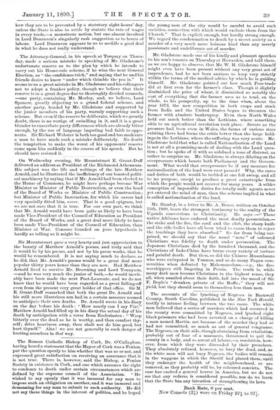The accounts of the lynching of Negroes in Barnwell County,
South Carolina, published in the New York Herald, testify to intense feeling between the two races. The white men believed that a series of murders whieh had occurred in the county were committed by Negroes, and lynched eight black prisoners who had been arrested on a charge of killing a man named Martin, not because of the murder they had or had not committed, so much as out of general vengeance. The Negroes; on their side, though abstaining from retaliation, probably out of fear of a massacre, threatened to quit the county in a body, and so arrest all labour,—a resolution, how- ever, from which they were dissuaded by their preachers. They absolutely refused, however, to bury the dead, and, as the white man will not bury Negroes, the bodies will remain, in the waggons in which the Sheriff had placed them, until they endanger the health of the neighbourhood, or are removed, as they probably will be, by coloured convicts., The case has exeited a general horror in America, but we do not see that any redress is considered possible, nor do we learn that the State kts any intention of strengthening its laws.






































 Previous page
Previous page